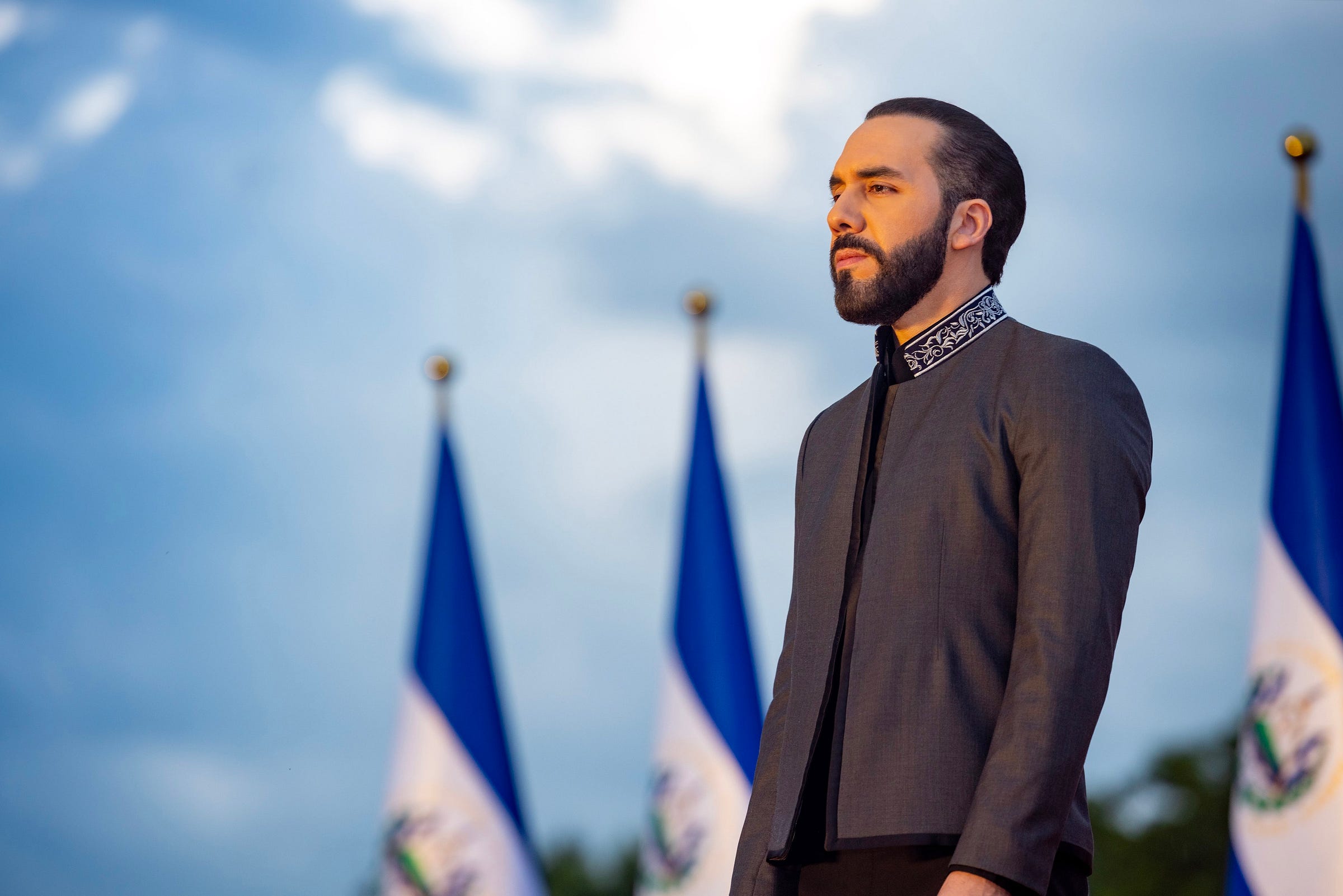Bukele goes after reporters who shared details on power-sharing pact with gangs
El Faro journalists fear arrest orders as Bukele blames "NGOs, elites, and Soros" for the new revelations
The power-sharing deal between Salvadoran President Nayib Bukele and gangs in the country is well documented. Salvadoran media organizations for years have published leaked recordings of his inner cabinet discussing the deal, as well as investigations that included government documents from intelligence operations, photos, and testimonies from the gang leaders themselves.
In 2021, the U.S. Treasury and State Departments both formally accused two government officials of participating in the pact. After the Treasury imposed sanctions on the two men, the State Department began preparing criminal charges.
On May 1, Salvadoran media company El Faro released previously unknown details of the pact as part of interviews with two gang leaders: Carlos Cartagena López, aka Charli de IVU of the Barrio 18 Revolutionaries, and another who showed his gang-related tattoos on camera but asked to remain anonymous.
The interviews included details on how gangs in El Salvador helped Bukele win his 2015 mayoral campaign in San Salvador and his 2019 presidential campaign in return for protection. The stories generated international headlines as U.S. President Donald Trump touts closer relations with the self-described “coolest dictator in the world” as part of a deal to house migrants deported from the U.S. in the infamous Salvadoran CECOT prison.
On May 3, the Director of El Faro, Carlos Dado, released a video on social media saying “We have received trusted information from reliable official sources that the Attorney General’s Office is preparing arrest warrants against some [of our] journalists.”
It isn’t the first time Bukele has gone after journalists who have published investigations that portray his administration in a negative light. Most of the staff of El Faro have fled El Salvador in recent years amidst both legal and extra-legal harassment.
Bukele passed new “anti-terrorism” laws in Aptil 2022 that criminalize journalists for speaking with gang members, or even writing about them. The law has also been broadly criticized by press freedom organizations who worry the language is vague enough that any journalist criticizing government actions could be considered to be “aiding terrorism”.
On May 2, Bukele released a non-denial of the accusations saying, “It is clear that a country at peace, without deaths…is not profitable for human rights NGOs, nor for the globalist media, nor for the elites, nor for Soros. He claimed that “the problem [these entities] have” is that El Salvador “is becoming an example for other countries: that it is possible to defeat terrorism, that it is possible to live in peace.”
Bukele launched his “war against gangs” on March 27, 2022, after 87 people were murdered by organized criminal groups in a single day. According to reporting from multiple Salvadoran media organizations, the massacre occurred after the government’s secret pact with the Mara Salvatrucha 13 (MS-13) gang and the two factions of Barrio 18 was broken.
Since then, roughly 85,000 people, or two percent of El Salvadors’ population, have been imprisoned in deplorable conditions, without the right to a legal defense, and nearly 400 of them have died without trial, many with signs of torture.
El Salvador has become the prison capital of the world. And human rights abuses are rampant.
“No body, no crime”
“Without a body, there is no crime.” Those were allegedly the words Carlos Marroquin, a close ally of Bukele, and one of the men accused of corruption and ties to organized crime by the United States, told gang leaders, as part of the power-sharing pact.
El Salvador was once the most dangerous country in the world outside of active war zones. It is now among the safest. It is undeniable that the homicide rate has plummeted since Bukele declared his “temporary state of exception” more than 3 years ago.
But the drop in homicides has been matched by a rise in “disappearances” in recent years, in which people simply go missing and are never heard from again. The gang leader, Charli, says that this was part of the formal agreement between organized crimes and the Bukele government.
Charli was released from jail after the state of exception began. This had already been well-reported. But in the new interview he says was “escorted” to his home by security officials as part of the very deal he had negotiated with Marroquin.
He promptly fled the country but continued working with the gang. According to statements in the interview, the gangs were responsible for getting Bukele elected, both as mayor and then later as president. They did so by threatening opposition activists, convincing residents in the regions they controlled to vote for Bukele either through threats or bribery, and even by attacking and threatening opposition politicians, he claims.
He also claimed to be in touch with other Salvadoran gang members outside of the country whom the Bukele government has gone to great lengths to silence. CNN initially reported last week that part of the Trump administration’s deal for El Salvador to hold prisoners in CECOT includes provisions to release gang leaders currently held in the U.S. to El Salvador — presumably to avoid further testimony and new details about the power-sharing deal.
“Of course,” says Charli in the interview. “Bukele has to silence them.”
At least one other gang leader has been illegally released During Bukele’s administration: Elmer Canales Rivera, aka Crook, one of the top MS-13 leaders worldwide. The United States requested Crook’s extradition in late 2020.
He was supposed to be serving a 40-year sentence in a maximum-security prison in El Salvador, but was captured in November 2023 in Mexico, after El Faro reported that he had been released and transferred to Guatemala with the help of a public official.
U.S.- Salvadoran Relations
Although in the beginning of his administration Joe Biden and the U.S. government attacked Bukele for corruption and human rights violations, by 2022 State and Treasury Department officials had agreed to largely ignore authoritarian backsliding in El Salvador.
They dropped sanctions and criminal charges in return for cooperation on migration policy, and became a strong partner to an increasingly authoritarian Bukele, who defied constitutional law to overwhelmingly win a second term in office.
In 2022 El Faro released recordings of Carlos Marroquin talking about details of the power-sharing pact with criminal gangs. By then however, the Biden administration had decided to enforce “deterrence” migration policies which supported crackdowns and cooperation with Central American countries and Mexico.
Criticism of the emerging dictatorship in D.C. had largely stopped.
Trump and Bukele, however, grew closer under the Biden administration and Trump’s second presidential campaign. After he took office in January, Trump dispatched his Secretary of State, Marco Rubio, to conduct a series of meetings with the Bukele government.
In March, the two discussed the details of El Salvador imprisoning migrants deported to El Salvador, and presumably the details of keeping MS-13 members held in the U.S. silent.
Meanwhile, Bukele’s assaults on press freedom and civil society continue. It is worth noting that the vast majority of tattooed gang members held in CECOT prison were arrested before the terrorism center was built.
Most of the 85,000 people detained by his security forces look very different.
The Big Headlines in LATAM
The Trump administration has long planned to declare large sections of the southern U.S. border a military base to allow federal military forces to act as law enforcement officials against migrants. This week, they put that plan into action.
The move is a dubious workaround of the Posse Comitatus Act, which prevents soldiers from policing civil society. As of Thursday, 82 people had been detained and charged with “trespassing” on military property by federal forces.
On April 29 Argentina declassified and published thousands of Intelligence documents, many pertaining to Nazi war criminals who fled to the country after World War II. The country’s National Archive has posted the files, which also describe Intelligence actions against domestic communists during the dictatorship, were previously only available in person under strict security protocols.
Human Rights Watch on Thursday released the results of a new investigation about crackdowns by security forces in Venezuela following fraud-plagued elections in June of last year. The NGO published details of “arbitrary detention, torture, and murder” by security forces, as well as extra-judicial killings of opposition protesters by paramilitary forces allied with the government.
Migration to Mexico is skyrocketing. Asylum claims last year were up over 45% compared to 2023, and continue to rise in 2025. The United Nations Refugee Agency this week released a report asking Mexico to improve treatment of migrants/ Security forces have been convicted in cases of extorting migrants, sexual assault, and even massacres in recent years.
The Ship’s Log
Have you signed up for our new vertical and daily newsletter, LATAM Daily Wires? It’s a new, faster, sleeker daily with shorter briefings on breaking news in Latin America, Monday to Friday. It’s a good time to sign up, because we are in the middle of a subscription drive!
The vast majority of our content is free (with just a few special treats for those who help us keep the doors open), because we firmly believe the role of independent media is to inform the public rather than hide news behind clickbait headlines and paywalls.
As you know if you’ve been reading PWS these last three years, we are a collective of freelance journalists who believe in publishing hard-hitting stories with the context and original reporting that the big media companies can’t. But this takes time, effort, and sometimes travel. Please consider taking out a subscription. We have plans that start at just $5/month.
If you prefer to avoid monthly subscriptions, we also have a page over at “Buy Me a Coffee”, where you can help us out with a one-time donation. It’s easy and takes only a few moments. A few dollars might not be much for you, but it helps us immensely.
Spanish Word of the Week
Sapear- literal translation: “to toad”
A sapo is a toad. It’s also a slang term in most of Latin America for a “snitch”. For example, in grade school if someone raised their hand and told the teacher “Mr Smith, Johnny and Lisa are passing notes,” you might say to them “no seas sapo” (don’t be a toad).
Well, the noun, like many nouns in Spanish, can also be made into a verb! Spanish is cool like that. So, sapear, would mean roughly “to rat someone out.”
So we could say, for example, “hasta funcionarios del gobierno de Bukele lo han sapeado.”
“Even members of Bukele’s government have ratted him out.”
Hasta pronto, piratas!





